Monthly Archive: September 2011
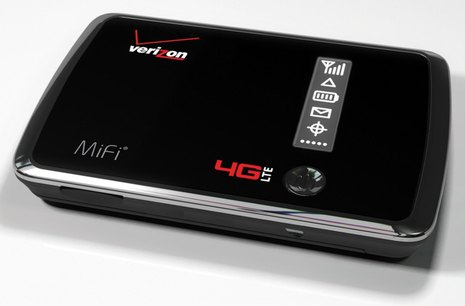
My experience having Verizon-provided internet access over cellular data protocols to my cruising sailboat spans three years and five devices, the Verizon 4G LTE MiFi built by Novetel released this summer being the most current. They’ve worked well enough that I’ve never messed with a high power boat WiFi system, like Ben has, but they are not perfect…

Did you ever see the first-in-20-years Bob Dylan interview with Ed Bradley where Dylan expresses astonishment at lyrics he once wrote (like It’s Alright, Ma), and said he couldn’t do again? A memorable TV moment with a weird and reluctant diety, I thought. My work is absolutely not comparable to Dylan’s, but I do sometimes run across a piece written long ago that surprises me in a good way. That happened today with a 2004 PMY column called “Monkey Business” whose intriguing subtitle is “Charts separate men from apes, but the path from paper to digital passes through the jungle.” I thought I’d republish it with the images that are no longer online, plus links, corrections, and more images. Hope you enjoy…
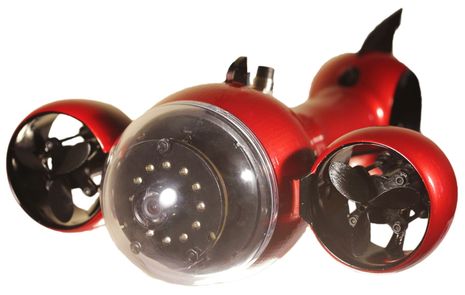
How neat would it be to launch an HD-video-camera-equipped underwater ROV off your boat to check out running gear, your mooring, or just whatever the heck is down there? And wouldn’t it make sense to view the results on an iPad, and even control the ROV’s movements largely by tilting and turning the pad? Yes, it sounds like a megayacht toy — and it might make a good one — but a brand new Massachusetts company called Aquabotix is hoping for a wider market…
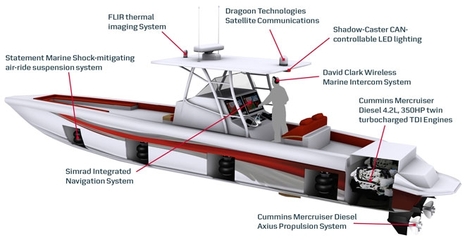
Rats. I got excited that an accomplished-sounding guy named Chris Fertig had departed New York Harbor yesterday morning in an attempt at the Bermuda Challenge. He hoped to beat the current speed champ “while using less fuel and producing less engine emissions.” But the Spot tracking page for TDI Clean Diesel indicates that he hung a hard right for home at around eight last night. The boat is still moving right along, so there’s no sign of gear failure, but my calculations show an average speed of only 28 knots for the first 290 miles, and he’d been hoping for 35. Plus his track had started zig-zagging a bit suggesting a contentious sea state despite the Statement Marine’s “shock mitigating suspension system.” Giving up on a sure-to-lose attempt might have been my decision too! But let’s discuss the Challenge and some of Fertig’s gear anyway…
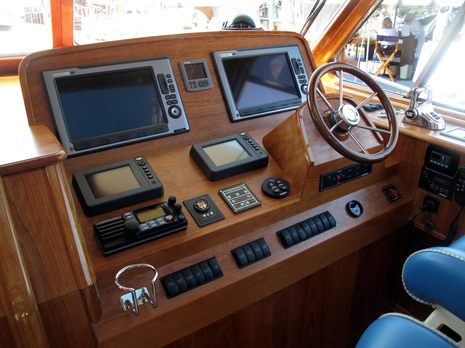
That’s the helm of the Hinckley T55 with the wireless JetStick I discussed yesterday. It’s undeniably gorgeous but it’s also fairly terrifying to a guy like me who changes electronics frequently. I so believe in mounting as many electronics as possible in panels that are easily replaced. And I’m really not all that odd; electronics get updated a lot these days. Heck, that ST70 on center is already being replaced with the i70 which would way better compliment those twin E-Wides, but the simple hole-saw i70 cutout is quite different than the ST70 hole. Here’s betting that it won’t be too long before sweat and money is expended chopping into that fine joiner work. Note, too, how many different little control systems are sprinkled around this helm, which is no fault of Hinckley, but rather an indication of how much further the marine electronics industry has to go toward truly integrated helms…
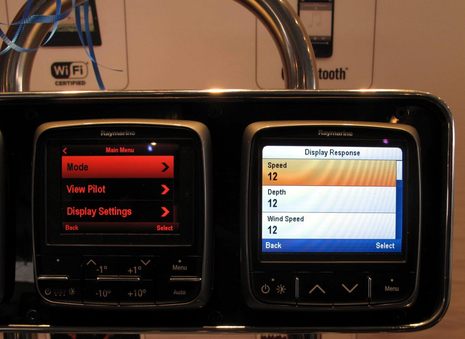
It’s rare that I go so long without writing an entry, and I’d like to say that I spent the time digging deep into electronics at the Newport International Boat Show. But the truth is that most of my time there went to working as one of the several Newport for New Products award judges, plus I met with my Cruising World and Yachting editors (first office visit ever 😉 and did a lot of driving. So unfortunately I didn’t get much more than a glance at the new Raymarine i70 instrument display (and p70 pilot head) seen above. The i70 display is wicked bright, the buttons are big, and moving through menus is snappy, but a fuller appraisal will have to wait. Incidentally, the WiFi and Bluetooth signs in the background of course refer to Ray’s new e7 MFD and are germane because those two capabilities are probably the main reasons that the e7 won the Best New Boating Product award…
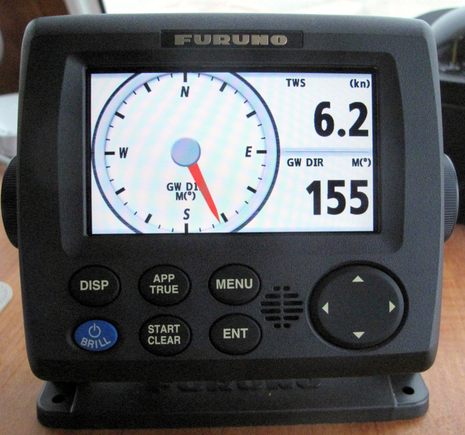
Please trust me that the Furuno RD33 — first discussed here in March, 2010 — looks better than I’ve managed to photograph yet. And, somewhat oddly, it seems that you’ll find more screen shots and a better brochure on Furuno.com’s RD-33 page as opposed to FurunoUSA’s RD33 page. In fact, you’ll have to look elsewhere for images of the many handsome data pages that an RD33 can flip through because today I’m going to focus on a few behind-the-scenes screens…
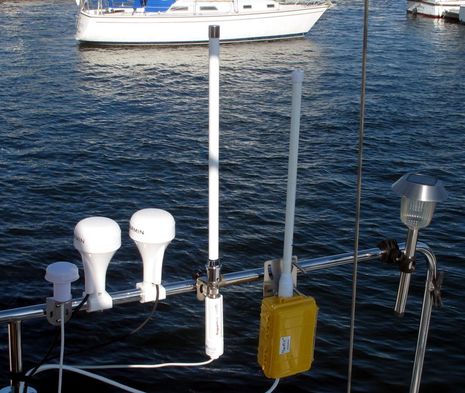
Perhaps the main thing I learned while testing the Rogue Wave and the WireAP this summer is that I love having a private WiFi hotspot on Gizmo. The Rogue is Ethernet cabled to Land & Sea’s refurbished Netgear router and both are wired to a 12v fuse block, while of course the WireAP simply has a single 12v feed because both its high power WiFi client and access point are in that yellow waterproof case. So in either case I can step aboard, flip one switch and if the last shore hotspot used is still available then everything that can be online via Wifi — Datalux nav computer, Mac Mini, iPad, iPhone, Android Incredible, or even the Vizio TV — is online whenever it’s powered up…
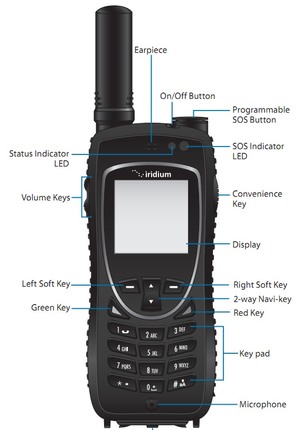
“Iridium Force” — announced today with much fanfare — seems to be an entire “vision for the future of personal mobile satellite communications”, a bunch of new hard- and software products, and what may be a heck of a business strategy. You can read the press release or sign onto a whole Iridium site full of videos and more, but just the hardware tells a lot of the story. The new Iridium 9575 Extreme handset seen above is not just a highly ruggedized version of Iridium’s most recent 9555 sat phone; it includes an internal GPS, a dedicated SOS button, and it seems capable of doing most everything that devices based on Iridium’s 9602 SBD modem can do, like, say, the DeLorme inReach and the YellowBrick3 that are both due to ship soon…
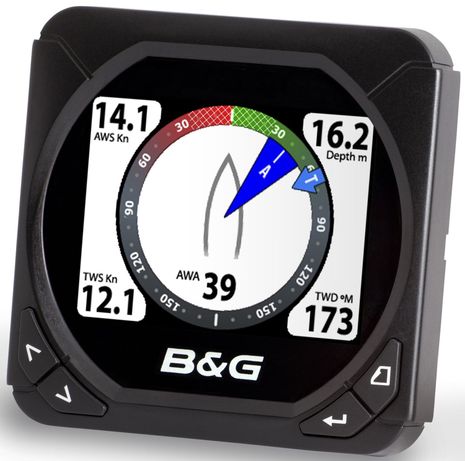
When I hinted last week that the new Raymarine i70 all-in-one NMEA 2000 instrument would soon have a new competitor, I honestly didn’t realize that the B&G Triton would be announced today (with at least the Australian release online already). The Triton T41 sports a 4.1-inch color display under a 4.6-inch square bezel while the i70 has a 4-inch screen in a 4.53-inch high by 4.3-inch wide case. And I’ll bet the Triton is also LED backlit as it too claims wide viewing angles along with a power range of just 50-150 milliamps, which seems similar to Ray’s claimed 135ma “typical” usage. You’d almost think that Navico and Raymarine were looking over each other’s shoulders!…



















